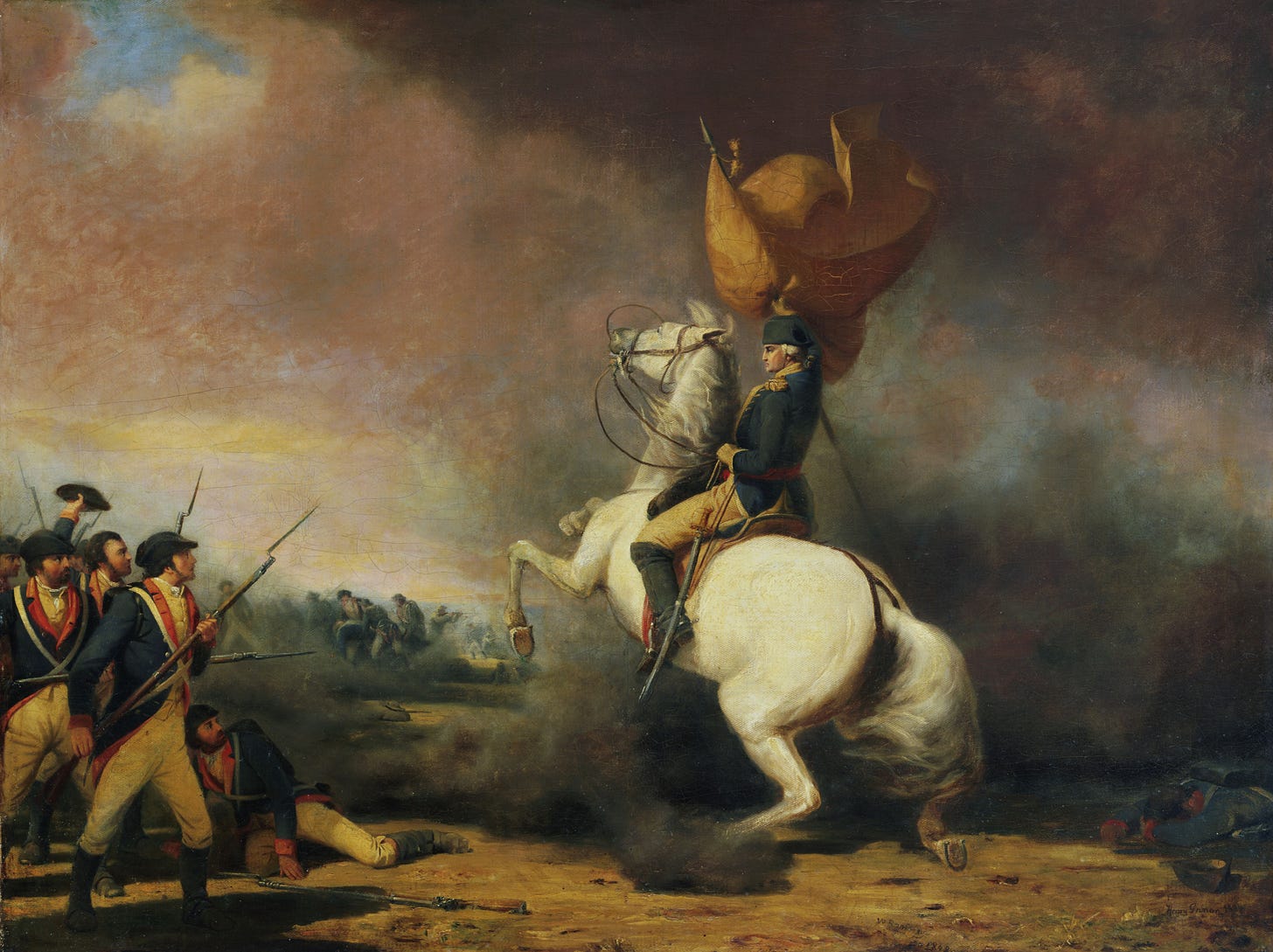TWIH: The Battle of Princeton
"I believe they were as much astonished as if an army had dropped perpendicularly upon them," Henry Knox later said.
During this week in 1777, George Washington wins the Battle of Princeton. It was the Americans’ second stunning victory in only 9 days!
As you will remember from Sunday’s post, Washington and his men were in a bit of a bind when night fell on January 2, 1777. British troops, led by Charles Cornwallis, had returned to Trenton to recover the ground that they’d lost during the battle of December 26. The British had attacked the Americans three times, near Assunpink Creek, but they had been repelled each time. It was getting dark, and Cornwallis decided to retire for the night. He allegedly remarked that he had “the Old Fox safe” and would “bag him” in the morning.
I guess Washington didn’t get the memo?! He and his army snuck away during the night, leaving behind a small contingent of men who kept the campfires burning and otherwise maintained the appearance of an occupied American camp. The British did not realize Washington was gone until it was too late.
In the past, such a disappearance would have meant that the Americans were retreating. Not this time! Instead, Washington and his men disappeared down back roads, and they made a wide sweep across the New Jersey countryside. Their goal? Princeton, where Cornwallis had left some of his troops behind. At daybreak on January 3, some of those men were preparing to leave and join Cornwallis at Trenton. Instead, imagine their surprise when they saw the Americans coming!
An American officer, Henry Knox, later wrote: “They could not possibly suppose it was our army, for that they took for granted was cooped up near Trenton. . . . I believe they were as much astonished as if an army had dropped perpendicularly upon them.”
British troops were already marching toward Princeton when they saw a portion of the American force approaching. The two sides met in William Clark’s orchard. The fighting was intense, and the British were fighting well. British Captain William Hale later remembered that “we kept possession of the orchard for twenty minutes, turning one of their own guns upon them.” The Americans were also fighting courageously, but they began to break when some of their officers were killed. One of these officers, General Hugh Mercer, was struck down with the butt of a musket. As British soldiers gathered around him, one demanded: “Call for Quarters, you damned rebel.” Mercer refused! Instead, he lunged at them with his sword, yelling: “I am no rebel.” Mercer was bayoneted multiple times and left for dead on the field.
Fortunately, at that critical moment, more American reinforcements began to arrive.
Perhaps most importantly, Washington himself arrived, and he took charge of the situation. He shouted to the soldiers: “Parade with us, my brave fellows! There is but a handful of the enemy, and we will have them directly.” His presence on the battlefield inspired the men. One soldier later wrote: “I shall never forget what I felt at Princeton on his account, when I saw him brave all the dangers of the field and his important life hanging as it were by a single hair with a thousand deaths flying around him. Believe me, I thought not of myself.”
I’ve said it before, but I’ll say it again: I really do not think we can overestimate the importance of Washington’s leadership at critical moments in our history.
Before long, the British were retreating, quickly. Washington took off after them on his horse, yelling: “It’s a fine fox chase, my boys!” The remaining troops in Princeton itself also ended up surrendering or retreating.
So the answer to yesterday’s question: Yes! I suppose there was a fox hunt on January 3, as Cornwallis anticipated. And perhaps you could say that a fox got bagged. But that fox wasn’t Washington.
Sources can always be found on my website, here.





Yes, George Washington inspired his troops by appearing on the battle field because as I believe, General Washington was protected by God. His presence and commanding voice were inspired by God and his men felt that presence. HisTrenton guise allowed him to conduct a fox chase and take Princeton away from the British. Leadership was one of Washington's greatest attributes if not the greatest. Thank you Tara.